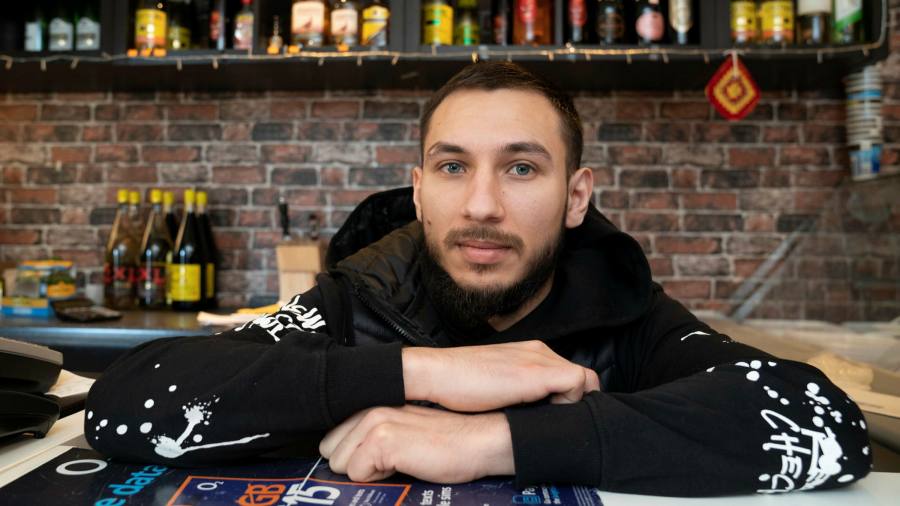[ad_1]
Razvan Ungureanu’s family opened their convenience store in a disused optician’s in Preston, northern England, two years ago to cater to the growing population from Romania, his home country.
But they are closing Everyday Essentials next month.Â
“There is no profit,†the 23-year-old said. “Everyone is scared of Covid and Brexit. They are going back home.â€
A growing number of EU migrants have been put off remaining in the UK by the pandemic, the post-Brexit uncertainty, and the relative weakness of the pound, which makes countries paying in euros more attractive.
Many have already left and when Covid-19 travel restrictions are lifted many more are expected to follow. The impact this will have on towns and cities like Preston is unlikely to be known until the economy opens up and the drop in population — and particularly a potential shortage of workers — is felt.

The Migration Observatory at Oxford university estimated that the UK’s foreign-born population shrank by just over 1m to 8.3m in the first three quarters of 2020. About 481,000 of those departing were born in the EU, reversing an influx that began in 2004. The UK’s EU-born population is now about 3.1m.
However, Madeleine Sumption, its director, warned there was “absolutely massive uncertainty†about migration because the UK did not produce reliable statistics and the pandemic had made them even less accurate.
The UK, Sweden and Ireland were the only EU countries to allow free movement immediately from the 10 new member states that joined in 2004, mostly poorer nations in central and eastern Europe.Â
Millions of Poles, Latvians, Slovaks and others moved for better wages, to be followed by Bulgarians and Romanians after 2014 when they obtained freedom to work in the UK. The impact on former industrial cities such as Preston has been profound. Of its 140,000 population, some 5,000 are EU born, the Observatory said.
Catholic churches on the brink of closure acquired new, younger congregations and Polish priests. School rolls swelled. Factories, warehouses and farms gained motivated, hardworking workers who boosted productivity. New pubs, takeaways and shops opened.
That process has now slammed into reverse.Â
Sashu Ivanov, 26, is among those heading home from Preston after a year in the UK packing salad for supermarkets. “This coronavirus is bad. I want to go back to Bulgaria.
“My family is not here. If I get ill I want to be with them,†he said.
Agnieszka Bleka, who owns Workforce Consultants in the city, which finds jobs for east Europeans, said there was a big drop in migrant numbers in 2019, at the height of the Brexit uncertainty, and departures continued last year.
“People did not know what was going to happen,†she said. “They were scared.â€
Ungureanu, the shopkeeper, said he would remain, for now. He will help his Romanian brother-in-law, Marian Turcu, with his cleaning business, which has contracts with housebuilders to prepare properties for new occupants.
“I have always looked for a better job and now I have a family business. The UK is great,†said Turcu, who arrived in 2014. “Companies will work with you if you do a good job and get your qualifications.â€Â
These more settled migrants were more inclined to stay, said Sumption. By 2019, more than half of EU nationals had lived in Britain for at least a decade.
Marcin Poltorak is one. He came to Preston from southern Poland in 2004 and now works as a security guard and doorman. His eldest son attends university in the city.Â
“Most Poles have a stable job and a family. They don’t want to go back,†he said.
EU migrants in the UK can gain settled status to remain after Brexit, which took effect on December 31, 2020, though many felt unwelcome, Poltorak said.
There were some attacks on EU-born families and property after the 2016 EU referendum in and around Preston, he said.
Resentment at immigrants changing the make-up of longstanding communities was a factor behind the Brexit vote. In Boston, Lincolnshire, where a fifth of the population is EU born, 76 per cent voted to leave the EU.
Poltorak runs Polskie Info Lancashire, a Facebook group for Poles in the county of which Preston is part. A snap poll he ran for the Financial Times with 250 answers found that 9 per cent of respondents had gone home or were considering doing so.
Those leaving might return when the economy recovers from the pandemic, said Paul Swinney, chief economist at the Centre for Cities think-tank.
“If migrants do not come, there could be two consequences,†he said. “Wages could go up as competition for labour increases. Or companies could invest in machinery to reduce the need for labour.â€

Businesses built around the migrant communities will be most affected. On New Hall Lane, a scruffy thoroughfare next to Preston prison, there are half a dozen eastern European shops while even the kebab takeaway advertises in Polish.Â
But flats above the shops and terraced homes in neighbouring streets are still in demand, said Monika Michalska of MJ Properties, who works for local and London-based landlords.
“We have had 20 people come from London since the first lockdown,†she said. “The jobs there are in bars and hotels which are closed. Here we have jobs in factories and warehouses.â€
But she added that the pandemic made it difficult to judge long-term trends.
Bleka, the recruitment agent, is preparing for change. She said she would probably hire a Romanian to target that community. And with companies fearing staff shortages, she was also planning to recruit British agency workers. “They forecast 2.5m unemployed by the middle of this year,†she said.
“If we get a strong recovery companies will need workers. There are enough people to fill those vacancies if people want to work.â€
[ad_2]
Source link










